- Home
- Jonathan Stroud
The Empty Grave Page 17
The Empty Grave Read online
Page 17
“St. Thomas’s Hospital,” Holly said. “It was a Night Cab driver who found him. You know that guy Jake we use a lot? He was turning down the end of Nightingale Walk. Just by chance, Lockwood, he was taking a shortcut. If he hadn’t been, if he hadn’t been there, Lockwood, there’d have been no one with George until dawn. And then—”
“So Jake found him,” Lockwood interrupted. “I get that. Where was he? What exactly had happened?”
“He was lying on the edge of the sidewalk, half in the gutter, and at first Jake thought”—Holly gulped back tears—“thought he was just a pile of old clothes that someone had dumped there, Lockwood. A pile of old clothes! Then he recognized George’s jacket. He said he was sure that George was…At least, there was so much blood, he couldn’t imagine how he could possibly be—”
“Blood?” I said. My hand was clamped over my mouth. “Blood? Oh no….”
“How was he lying?” Lockwood’s voice was unfamiliar; he fired the words out, forcing Holly to speak. “Was he faceup, facedown, what?”
Holly wiped her eyes. “He was facedown, I think.”
“He’d been beaten?”
“I—I think so—”
“He wasn’t conscious?”
“No.”
“Did he regain consciousness at any time?”
“No. He was taken to the hospital. Jake called a night-ambulance. Luckily, there was one nearby. He went with them. George is there now.”
“Any word on how he is?”
“No.”
Lockwood was moving down the hallway. His face was stricken, his jaw clamped tight. He brushed past Holly like she wasn’t there. Then he stopped. “How did you hear about it?” he said. “I thought you’d gone home.”
“I had. Jake knows where I live; he’s driven me home before. He tried here first, then stopped by my place. I came back, waited for you—”
“All right. I’m going to make some calls.” Lockwood headed toward the kitchen.
“Lockwood,” I said, “shouldn’t we—?”
“I’m going to make some calls. Wait here.”
He was gone. A moment later, we heard his footsteps clattering down the iron stairs.
Holly and I were left in the hall. We looked at one another, but it wasn’t easy to meet each other’s gaze. Hugging was better. That way we could be close, while staring out at nothing. There wasn’t anything else we could do.
Even now, when so much else has happened, the events of that dreadful night remain mostly a blur to me. Their sequence is unclear. Time did strange things. I have no idea how long I spent anywhere or in what order—in the hospital; in the hall with Holly; later (it must have been later, after our return from a fruitless visit to St. Thomas’s, with no word on George’s condition) sitting with her under a blanket on the sofa, sleepless and silent, waiting for Lockwood to return. For some reason it’s the lights I remember most: the crystal skull lamp in the hall; the tasseled lantern on the living room cabinet; most of all the striplights crossing the ceiling in the hospital waiting room like a row of minus signs, like center markings on a road to nowhere, with the iron ghost-wards dangling beside them, moving in the air-conditioned breeze. Lights, always lights; strong, weak, harsh, or warm, but always indifferent and always on. It was a night without darkness; you couldn’t switch off or look away.
How did I get to the hospital? How did I get back? I don’t remember. Lockwood was there with me, at least at first. I have a snapshot of him in a car, the white glow of the ghost-lamps (those lights again) flashing across his pale, blank face. We didn’t talk, not then, nor during the endless waiting. We weren’t permitted to see George. We weren’t told how he was, or where he was. I have a memory of someone (Lockwood? Me?) kicking a chair across the reception room, but I have no memory of the lead-up to it, nor of the consequences, if there were any. At some point, Inspector Barnes was there, and also Quill Kipps, though neither of them stayed long. Then—somehow—I was back at Portland Row with Holly, a bowl of popcorn wedged between us, and the white dawn showing through the messy crack in the half-drawn curtains.
Night fed into morning and Lockwood did not return. He didn’t come back from the hospital all that day. He sent word through Kipps, who showed up periodically, gallows-eyed and unshaven, with brief accounts of what was going on. What was going on was nothing. Nothing to stop the high, thin noise (too high, too thin to technically be a scream) that rang continuously in my head. George remained unconscious. He had suffered head injuries, and multiple contusions on his back and limbs. Lockwood had been allowed to see him, but only briefly. There was no point in going to the hospital. We would only be turned away.
Holly and I stumbled through what chores we could, focusing on insignificant details in an effort to pummel our existence into some semblance of rightness. I canceled a number of appointments we had for the evening. Holly tried doing some paperwork but quickly gave up. Instead we roamed the house. We sorted salt-bombs and refilled iron canisters. Holly went shopping. She bought a stack of doughnuts and cream buns, but somehow neither of us could bear to look at them. We put them in a cupboard. The day drifted on and on like this, and neither of us could sleep.
Whether through some quirk of empathy or (more likely) an acute sense of self-preservation, the skull in the jar didn’t try speaking to me. My head was empty of its psychic interference, which was a relief. In truth, though, it was empty of everything. I was scoured out, waiting.
Toward evening a final message from Lockwood came via Kipps. It bought news that I interpreted as hopeful, in the same way that a drowning man looks favorably on an outstretched twig. For the first time George was showing signs of responsiveness. He hadn’t yet woken properly, but there was movement now. Lockwood would remain for a second night.
Even then, it took me a long while to fall asleep. You might have thought that after thirty-six hours without rest, I’d be able to drop off easily. But I was wired into a grid that refused to cut the power. I lay on the bed, staring at nothing, thinking of nothing, and when I did doze, I almost as quickly woke again. At some point in the early hours I got up and drove my rapier deep into the bedroom wall.
Eventually, while it was still dark, oblivion must have come, because I was surprised when I opened my eyes and saw sunlight streaming in through my window. The face in the ghost-jar watched me silently. My sword stuck out from a jagged crack in the plaster just beside my chest of drawers. It was almost noon. I was still wearing my clothes.
I washed and dressed mechanically and went downstairs. The house was quiet as a church. It looked very clean and tidy. Yesterday Holly had even dusted the ghost-wards hanging on the staircase and landing walls. As I approached the kitchen I could hear her moving around inside. Little cozy domestic noises, of cutlery and crockery, like messages from a happier time.
“Hey, Holly…”
I pushed open the door and saw Lockwood standing at the window. He wore his usual dark pants and white shirt, tie-less, the collar unbuttoned. His sleeves were rolled up, showing his slim arms. His hair had not been combed, and it was not clear to me that he’d slept at all. Certainly he was as pale as I’d ever seen him, and his eyes shone with a strange, unhealthy brightness. But he smiled as he turned and saw me.
“Hi, Lucy.”
It was a moment that probably lasted less than a second, but it felt as if we were standing there for a lifetime. A lifetime of me waiting for Lockwood, waiting for him to say the necessary words.
I spoke fractionally first. “Is he—?”
“George is fine,” Lockwood said. “He’s alive.” He had his long thin fingers resting on a chair back; he stared at them as if they belonged to someone else. Then he left the chair and walked around the table and put his arms about me and pulled me to him. Time did weird stuff again. We stood like that for I don’t know how long. I would’ve been happy for it to go on longer.
“So he’s fine?” I asked once we’d drawn apart. “Really?”
Lockwood
sighed. “Well, no—not really. He’s got several types of concussion, but we all know how thick his skull is.” He smiled at me. “But he’ll live. He’s conscious, so you needn’t worry.”
“He’s woken up? He’s really talked to you and everything?”
“Yes. He’s a bit sleepy. But at least he’s home now.”
“Home? What? He’s here?”
“Not so loud. He’s upstairs. In my bed, as a matter of fact.”
“Not his room?” I paused. “Actually, no. I can see that wouldn’t work.”
“No, he’d just get sepsis. It’s fine like this. I’ll sleep on the couch.”
“Sure. Lockwood—I’m so pleased you’re both back.”
“Me, too. Do you want tea? Silly question. I’ll get you some.”
“So tell me what happened,” I said. “When did he wake? Were you with him? What did he say?”
“He didn’t say much—hasn’t said much. He’s too weak as yet. The doctor didn’t really want him to leave the hospital, but this morning he had to concede that George was out of danger, so…” Lockwood stared into space, holding a spoon. “Where do we keep the tea bags now?”
“On the shelf, where they always are. Have you had any sleep?”
“Not much. I’m not quite ready yet….What was I doing?”
“You were making tea. Look, I’ll do it. Where is Holly? She’s not yet been in?” Holly had gone home the previous evening, searching for elusive rest, like me.
“Not yet, I don’t think.” Lockwood hesitated. “How is she?”
“Oh, like the rest of us, I expect.” I glanced back at him as I stirred the tea. “While you were gone, I was thinking…You were very hard on her, you know—when she first told us about George, back in the hall.”
Lockwood took his mug in silence. Then he said, “I wanted every detail. I wanted to see that image of George as if I was there myself.”
“It’s not your fault, Lockwood.”
“No? Barnes thinks it is.”
I remembered the inspector, a brown and furrowed presence beneath his raincoat, passing me in a hospital corridor. It was a disconnected image, leading nowhere. There were no details. “How was Barnes when you spoke to him?”
“Civil.”
“What did he say?”
Lockwood sighed. “He didn’t need to say anything—his face was eloquent enough. He couldn’t talk openly, anyway—he had several police officers with him. And there was George’s doctor, too.” Lockwood shook his head. “I didn’t trust him. Barnes says he’s worked for both the Fittes and Rotwell companies. He might be okay, but…Anyway, I’m not having George out of our sight from now on. That’s why I brought him home.”
I looked toward the ceiling. “He’s out of our sight right now, if it comes to that.”
He shook his head again. “Not exactly. He’s got company.”
“Who? Not Holly. Not Kipps, surely. Or is Kipps here?”
“Flo.”
“What? Flo? She’s in the sick room?” I stared at him. “Is that sanitary?”
“She was very insistent.”
“How did she even find out about it?”
“I don’t know. She showed up an hour ago and barged upstairs. She brought some black things in a pot.” Lockwood rubbed the back of his neck. “I hope they were grapes, but with Flo you just can’t tell.”
I drank my tea, letting its warmth run through me. As so often, the feeling brought me back to the essentials. The moment became simpler, my needs clearer.
“Lockwood,” I said, “I want to see George. I want to see him now.”
The bedroom door was slightly ajar, and we were able to push it open without a sound. In the ordinary way Lockwood’s room was the opposite of George’s, being clean and tidy and sparsely furnished. Not that I went in it much, but I’d always linked it with sunlight and smooth white sheets and the smell of lavender. The sight of Flo Bones squatting in the armchair like a death-cap mushroom blew such associations into sweet oblivion. She lifted her straw hat up a notch and made stern shushing gestures. The air smelled antiseptic and also somehow stale and muddy, courtesy of Flo; the curtains were partly drawn. The bed was dim, the covers rumpled. It was hard to see its occupant at all.
We stole across the carpet. Flo’s puffer jacket rasped as she pulled herself free of the chair.
“Don’t disturb him!” she hissed. “He needs his rest!”
“I know he does,” Lockwood whispered. “How is he, Flo? Has he woken?”
“He’s been muttering all kinds of stuff. He asked for water. I gave him some.”
“I suppose that’s all right, if you’ve washed your hands. Come to think of it, while we’re at it, you could always take your boots off as well.”
“Take it from me, Locky, my socks would mark your carpet worse.” Though Flo spoke with her usual gusto, she kept her voice low, and I saw her watching me closely as I moved past her to the bed. It was a rare experience for her to linger any length of time in our dry, roofed world. She preferred living under stars and bridges, with water lapping at her Wellingtons, in an isolated and amphibious life. None of that applied now. She was here in our moment of crisis. She was here for George.
The thing that struck me first was how small he looked, how low and sad the bump was under the sheets. You might almost have missed him, your eye drawn instead to the piled pillows or the bedspread half on the floor. But no, there were the distinctive glasses set carefully on the bedside table, with a diagonal crack running neatly through one lens. And there, wedged between the pillows—the sight of it made me catch my breath—was a roundish object, both dark and light. The light part was bandages, with a few sad wisps of sandy hair protruding. The dark part was bruises. There wasn’t much in between.
“Oh, George,” I said.
The shape stirred feebly, making me jump; it gave a groan and said something unintelligible. An arm emerged and flopped down upon the sheet.
“Now look what you’ve done, you silly mare!” Flo hissed. “You’ve only gone and woken him up!”
But Lockwood and I were already by the bed, bending close beside him.
“George!”
“Hey, George. It’s me, Lucy.”
George tried to speak. It shocked and horrified me how feeble his whisper was. More even than the sight of that battered face or the shrunken body in the bed, that whisper was an atrocious thing. He tried again: husky, urgent, impossible to hear. We craned our heads nearer. George hadn’t opened his swollen eyes. His hand clutched blindly, seized Lockwood’s arm.
This time the words came out. “They took it,” he whispered.
“What?”
“Marissa’s book. I had it, but…” The words trailed away.
Lockwood’s expression frightened me, but his voice was light and airy. “Oh, don’t worry about that,” he said. He patted George’s hand. “All that matters is that you’re here at Portland Row. Luce’s here, and me, and you know you’ve got good old Flo here beside you, too….”
George’s hand fell back. “Yes…yes, that’s good.”
“Yes. So the important thing is that you need to sleep now, George.”
The bandaged head erupted from the pillow. We both jerked back. “No! I had it! Marissa’s book! The evidence, Lockwood…!” He subsided in a fit of feeble coughing.
Flo bustled forward. “Right. You’re exciting him. Time’s up.”
“No, it isn’t, Flo. Who was it, George? Who did this to you? Did you see them?”
“No. But…”
“But what, George? Was it Sir Rupert Gale?”
It took a long while for him to answer. I began to think he’d drifted off. The whisper was barely audible. “I smelled him. His aftershave. As I hit the ground…” The voice trailed off. “I’m sorry….”
“Nothing to be sorry about, George. Just rest up.” Lockwood patted the limp hand; he stood up slowly, straight-backed, looking at nothing. “We’re going now, Flo,” he said. “You’ll ca
ll us if you need anything?”
She nodded; she was already at the bedside, doing things with blankets. Given that she normally slept on riverbanks and muddy shingle, I was quite impressed. George had sunk back between the pillows. Once again he was just a small, low mound in the center of the bed.
We exited the bedroom and softly shut the door.
“I’ll kill them,” I said. “Lockwood, I swear I’m going to kill them.”
He said nothing; he was very still, standing in the shadows of the landing. I kicked out at the banister, hurting my foot in the process. I had to move. I had to strike at something. The fury I felt was otherwise too great.
“Sir Rupert Gale and those big bloody henchmen of his! I’m going to take my sword and go out and find them, and make them pay.”
“You’re not going to do that, Lucy.”
“I am. I’m going to kill them.”
“You’re not.”
“Why?”
“Because you’d only muck it up somehow. Also because it’s not our style. We’re going to do something better. And we’re going to do it as a team.”
I stopped trying to destroy his house and looked at him. A shaft of light was coming through the landing window; in its brightness Lockwood looked insubstantial, like he was some figure on stained glass. “Our enemies think we’re weak,” he went on. “Truth is, I’ve been holding back until now.” He smiled at me, his eyes as hard as flint. “Well, all that ends today. We’ll strike them where they least expect it. We’ll strike them, Lucy, and we’ll take them down.”
Lockwood’s vow sounded good, especially spoken in that shaft of sunlight and all, but I couldn’t help noticing that he wasn’t spelling out any details. In fact, he was utterly vague. This didn’t bother me particularly, because I knew he’d think of something. I just guessed it would take him a while to figure out a plan.
In this I was quite wrong. Lockwood not only had a plan, it was already well under way. I discovered afterward that he had been devising his response to the attack on George almost from the moment it happened. During his long vigil in the hospital, his initial shock had hardened into furious intent. He’d had plenty of time to explore his options, make decisions, and set his strategy in motion. But I only began to realize this when Quill Kipps showed up later that afternoon with a bulging plastic bag in his hand.

 The Leap
The Leap Buried Fire
Buried Fire Heroes of the Valley
Heroes of the Valley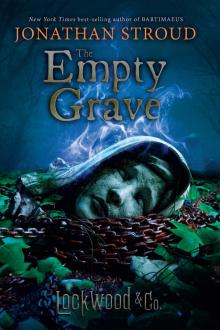 The Empty Grave
The Empty Grave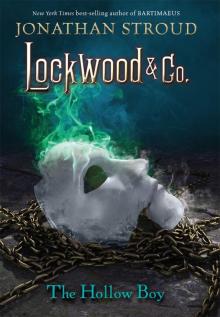 The Hollow Boy
The Hollow Boy The Last Siege
The Last Siege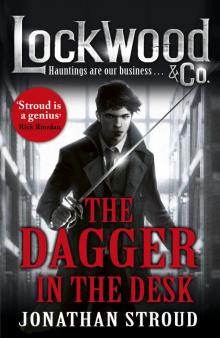 The Dagger in the Desk
The Dagger in the Desk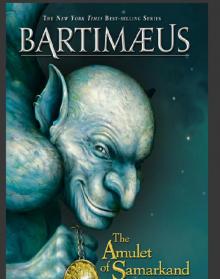 The Amulet of Samarkand
The Amulet of Samarkand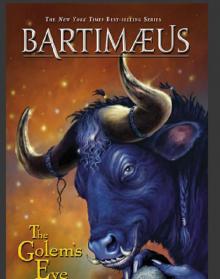 The Golem's Eye
The Golem's Eye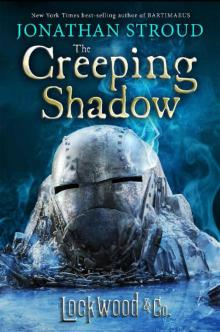 The Screaming Staircase
The Screaming Staircase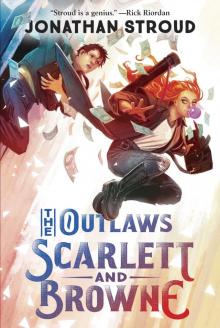 The Outlaws Scarlett and Browne
The Outlaws Scarlett and Browne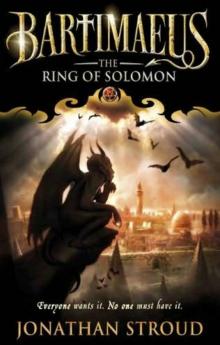 The Ring of Solomon: A Bartimaeus Novel
The Ring of Solomon: A Bartimaeus Novel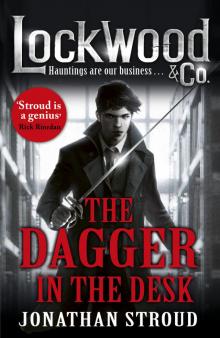 Lockwood & Co
Lockwood & Co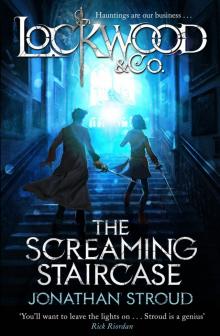 Lockwood & Co: The Screaming Staircase
Lockwood & Co: The Screaming Staircase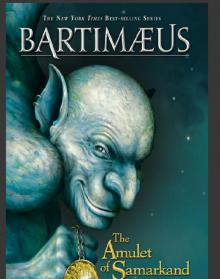 Bartimaeus: The Amulet of Samarkand
Bartimaeus: The Amulet of Samarkand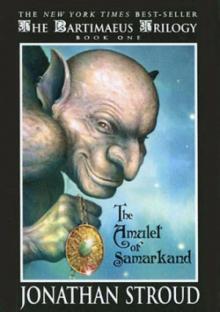 The Amulet of Samarkand tbt-1
The Amulet of Samarkand tbt-1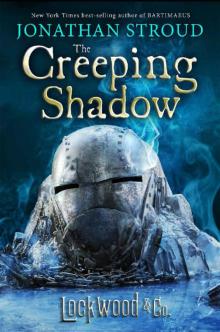 Lockwood & Co.: The Creeping Shadow
Lockwood & Co.: The Creeping Shadow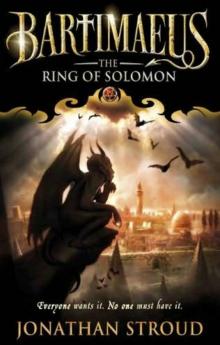 The Ring of Solomon
The Ring of Solomon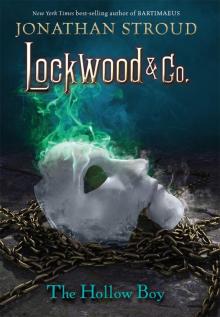 Lockwood & Co. Book Three: The Hollow Boy
Lockwood & Co. Book Three: The Hollow Boy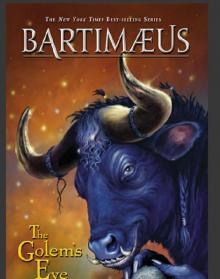 Bartimaeus: The Golem’s Eye
Bartimaeus: The Golem’s Eye